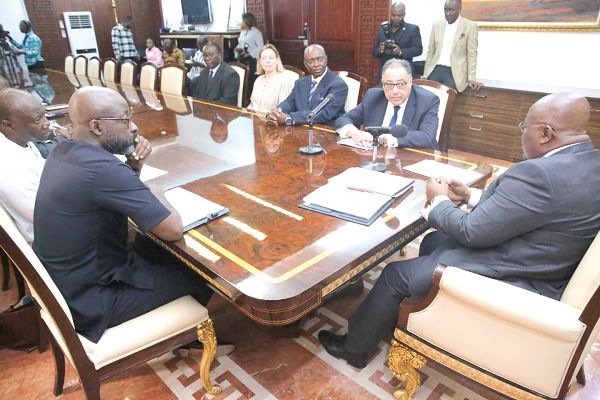
World Bank pledges to support free SHS
The World Bank has lauded Ghana’s decision to widen access to education, especially through the free senior high school (SHS) policy, and pledged its support to ensure the sustenance of the programme.
It described the free SHS policy as “extremely important”, saying that it would help and support the programme because it would help create an educated human capital, reduce child marriages to the barest minimum and decrease school drop-out rates which had severe demographic and developmental challenges.
Courtesy call
The World Bank Africa Vice-President, Dr Hafez Ghanem, pledged the bank’s support for the programme during a courtesy call on President Nana Addo Dankwa Akufo-Addo at the Jubilee House in Accra yesterday.
He did not mention the specific support that the bank would offer to the educational programme but stated that it would be under its human capital programme.
“So anything we will do to keep the children, both boys and girls, in school until the end of secondary school is very critical and we will be delighted and help as much as we can,” he assured the President.
Dr Ghanem, who is in Ghana for a three-day official visit, discussed issues bordering on macroeconomic, fiscal and monetary policies and highlighted opportunities for investing in education and the booming digital economy with the President.
He later joined the Vice-President, Dr Mahamudu Bawumia; the Senior Minister, Mr Yaw Osafo-Maafo; the Minister of Finance, Mr Ken Ofori-Atta, other ministers of state and the Governor of the Bank of Ghana, Dr Ernest Addison, for in-depth discussions on sector-specific issues.
He will also interact with key private sector officials to discuss Ghana’s business environment.
Studies
Dr Ghanem said the World Bank had conducted two researches, one on industrialisation and the other on the future of work, which indicated that industrialisation required development in the digital economy, the provision of digital infrastructure and the building of human capital.
He said the research on the future of work identified that in future there would be more jobs in the digital economy in services and finance than in manufacturing.
He stated that the bank would help Ghana in its industrialisation drive, so that it could use its current excess supply of gas to boost the production capacities of industries, as that would lead to the diversification of the economy and job creation.
Digital economy
The World Bank Vice-President hinted that the bank and the government would discuss how to provide adequate infrastructure, including fibre optics for universal access to the Internet, as well as regulations to ensure competitiveness in the telecommunications sector to help drive prices down.
He said other areas of support would be to help enhance e-governance, revenue mobilisation and the use of electronic tablets to improve teaching and learning in schools.
Education
For his part, President Akufo-Addo indicated that his government was keen on legislating a redefined basic education in the country which would compulsorily start from kindergarten, with secondary school being the minimum educational level, saying that that would become a strong legal weapon for making sure that all children, especially girls, stayed in school till they reached the secondary level.
He commended the World Bank for its sympathetic and proactive support towards the cause of Ghana, culminating in the disbursement of over $11 billion to the country since the 1960s.
The President said Ghana was at the crossroads in its development journey and was taking measures to halt the continued export of raw materials.
He said the country would rather modernise the economy and export value-added finished goods to attract higher value international exchanges.
President Akufo-Addo stated that providing the human capital with the best of tools, such as information and communications technology (ICT) capabilities and shaping the educational system to allow most, if not all, young people to have access to education was the focus.
He said the government was bent on instilling discipline in the management of public finances to position Ghana as the preferred investment destination to guarantee a self-sustaining economy, saying it was unacceptable for Ghana to have had 16 bail-out programmes with multilateral development partners since independence.
President Akufo-Addo said 25 years of uninterrupted democratic rule, coupled with three smooth changes of governments, was a manifestation that the people of Ghana had agreed to and accepted democratic governance as the way to go.
